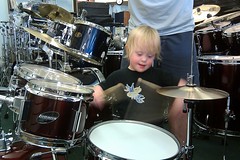Two readers made comments on this post. One of the comments is a couple of weeks old, the other came in last night. They're exactly the sorts of comments and questions I'm hoping for in my Disability, Power, and Privilege class this semester, so I wanted to address them quickly.
One is from Cate, who makes a point about the importance of cognitive abilities and says,
I mean, if my daughter's cognitive abilities can be improved enough so that she can live independently, I want that. (Not to say that she can't live independently anyway, but...how many people with DS do? really truly independently?)That question immediately made me want to look to the general population: how many nondisabled people live really truly independently? This sounds like I'm avoiding her question, and I sort of am, but I'm doing so in a way that makes me reframe my thinking.
I might automatically say that I live really truly independently, but of course I don't. I had a pretty major medical crisis a year and a half ago that required a whole team of people to be in place--even to move into my house--to help manage not only my health but my daughter and partner. These days I'm fairly independent, except for the fact that I'm reliant on Biffle to manage the whole day-to-day living thing. I'm reliant in ways that our culture feels quite comfortable with, so that's defined as independence. And let's rest assured that for anybody who is independent, that's temporary. In class Thursday we discussed Susan Wendell's point, "Unless we die suddenly, we are all disabled eventually."
Okay, not what Cate was actually asking about, but what her question made me think about.
alisondcarr made a comment a few weeks ago. She asked if I knew about an organization called the Sparkle Effect, which is an cheerleading organization that helps high schools create cheerleading squads that include typical people and people with disabilities. She asks,
the inclusion aspect--focusing on ability rather than disability--seems positive. but, does that run the risk of washing over the very thing that makes a person different? cheerleader business complicates this question for me.Yeah, me, too! As was the case with Cate's question, I don't have an answer here, just reflections. So let me start by saying I love inclusion. Love love love meaningful inclusion. What I'm skeptical of is pity inclusion, the sort of, "Oh, you can't be on the real cheerleading squad, but we'll create a special squad for you, and the typical girls are going to have something great on their college applications because they are so thoughtful and caring!" I have no idea if this is what the Sparkle Effect is about. I've done very little investigating. I'm just wary. (Okay, I just watched a video about one of the founders, and she does seem to be a high school girl trying to create social change in the terrain that's familiar to her--cheerleading--so go, her.)
 Obviously, if Maybelle decides she's going to be a cheerleader, I will show up and scream and clap and be incredibly proud. But I'm pushing for the meaningfully inclusive not-completely-gender-stereotypical experience. I hope that Maybelle can be a person not defined either by stereotypes of Down syndrome or stereotypes of gender. So let's rest assured that when Maybelle is 9, she'll be attending Girls Rock Charleston.
Obviously, if Maybelle decides she's going to be a cheerleader, I will show up and scream and clap and be incredibly proud. But I'm pushing for the meaningfully inclusive not-completely-gender-stereotypical experience. I hope that Maybelle can be a person not defined either by stereotypes of Down syndrome or stereotypes of gender. So let's rest assured that when Maybelle is 9, she'll be attending Girls Rock Charleston.


3 comments:
Cale's question makes me think that you and your grad students should think about doing some qualitative research with people with DS. Asking them what they think about the ability to increase their cognitive performance, live more independently (if they feel like they're not, etc..).
I love how you parse things out here. Every time I feel like stomping my little foot and saying "JUST BECAUSE THAT'S WHY" you lay it out in a way that quells the stomping and kickstarts the thinking. I imagine this will all be a book someday, so hook a sister up and holler when it gets there.
Keep preaching truth to power, yo.
On a light note, speaking of living independently, since I just watched part of one of those end-of-the-world movies last night & because of the ongoing flood damage/resulting isolation in VT, we should define living independently since no one does in this country. You want to talk "suffering"? Me - without my coffee maker or a hot shower. Makes me think the survivalists have the inside track. And in that sense, peculiarly, I think my daughter would do fine - it's the electronic funds transfers and cell phone applications that throw even her mother for a loop.
Post a Comment